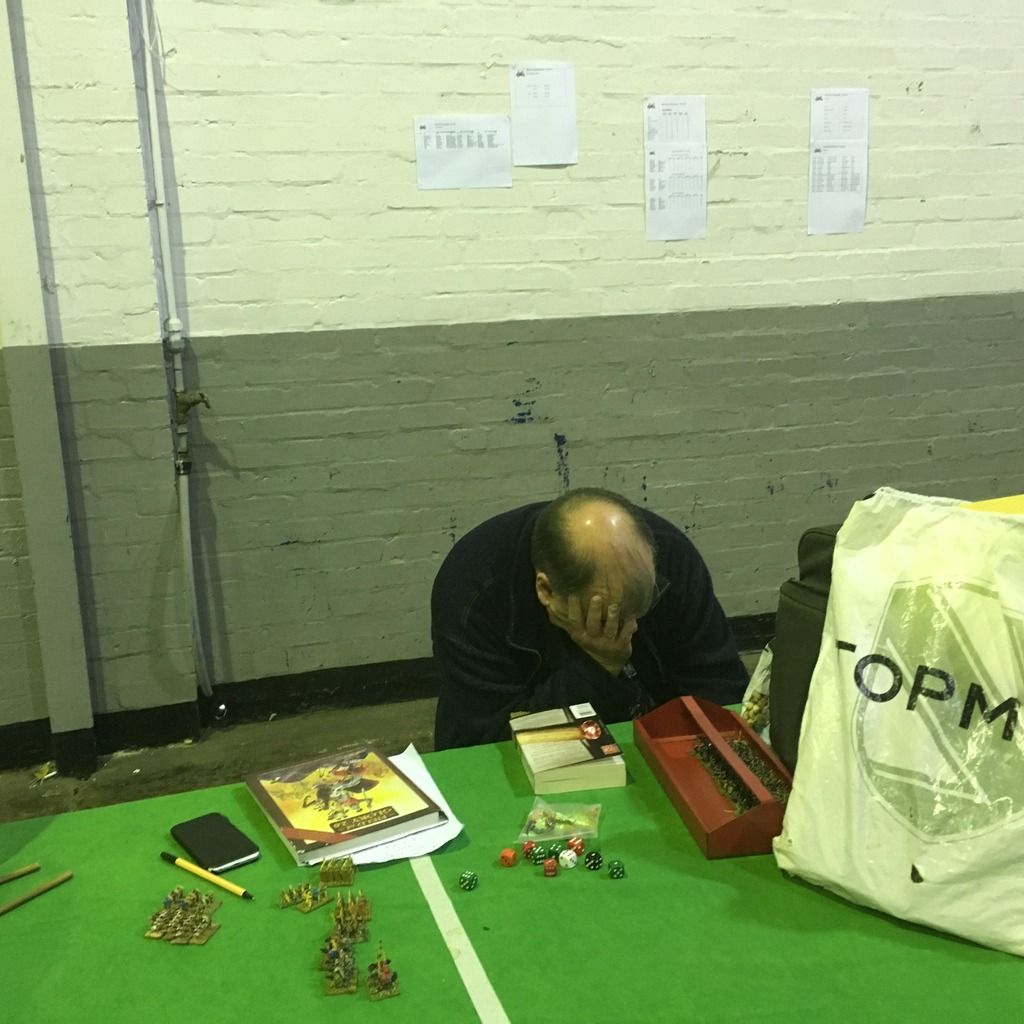Derby Teams 2016
Posted: Mon Apr 18, 2016 12:33 pm
FOG(AM) Competition at World Team Championships, Derby 2016
1st & 2nd October 2016
Please see http://www.worldwargames.co.uk for full event details.
The rules used will be the published version 2 of FOG together with the latest errata.
Scoring will be as per the score calculation sheet published on http://www.fieldofglory.com. Copies will be available at the competition. Scoring will be taken literally as shown on the sheet.
There will be 4 rounds of competition. Check-in is from 8:45 to 9:15 on Saturday with 1st round starting at 9:30, 2nd round at 2:00. On Sunday, round 3 starts at 9:00 and round 4 at 1:30. Games may start earlier than the designated time if both players agree, in which case the end time is unchanged.
This will be a team competition. Entries are invited from teams of 3 people, each of whom should be entered into a different pool. Entries are also welcome from individuals, who will be combined into teams at the organiser’s discretion. It would be appreciated if any individual entrants could be flexible as to the pool they enter to assist this process. Due to the team nature of the competition, individuals cannot be guaranteed entrance, although every effort will be made to accommodate those who want to play.
Pools will be themed as follows. Figure scale is 15mm.
Pool #1 – The Four Corners of the World (850 points)
The rise and fall of the Persian Empire 650 BC to 329 BC. Armies must be drawn from those listed below and must be dated in the range specified. Any allied contingents may be drawn from other lists as permitted by the main list and are therefore not limited to those below, provided that they also fall within the specified date range.
1 Median Empire Swifter than Eagles
2 Early Achaemenid Persian Immortal Fire
3 Late Achaemenid Persian Immortal Fire
4 Late Dynastic Egyptian Immortal Fire
5 Neo-Babylonian Empire Swifter than Eagles
6 Neo-Assyrian Empire Swifter than Eagles
7 Urartian Swifter than Eagles
8 Lydian Immortal Fire
9 Cimmerian or Early Skythian Swifter than Eagles
10 Skythian or Saka (Skythian options only) Immortal Fire
11 Classical Greek (not Siciliot or Italiot options) Immortal Fire
12 Thracian Immortal Fire
13 Alexandrian Macedonian Immortal Fire
14 Classical Indian Immortal Fire
15 Later Hebrew Swifter than Eagles
16 Neo-Elamite Swifter than Eagles
Pool #2 – A storm from the East (800 points)
Migrants to Europe from the Asian Steppes 550AD to 963AD and the conflicts they caused. Armies must be drawn from those listed below and must be dated in the range specified. Any allied contingents may be drawn from other lists as permitted by the main list and are therefore not limited to those below, provided that they also fall within the specified date range.
1 Maurikian Byzantine Decline and Fall
2 Thematic Byzantine Decline and Fall
3 Western Hunnic Legions Triumphant
4 Early Alan Legions Triumphant
5 Western Turkish Decline and Fall
6 Central Asian City States Empires of the Dragon
7 Rus Wolves from the Sea
8 Early South Slav Decline and Fall
9 Early Slavic Wolves from the Sea
10 Early Bulgarian Decline and Fall
11 Avar Decline and Fall
12 Magyar Wolves from the Sea
13 Great Moravian Wolves from the Sea
14 Pecheneg Decline and Fall
Pool #3 – Lords and Vassals (900 points)
Northern European Feudal 1050AD to 1300AD. Armies must be drawn from those listed below and must be dated in the range specified. Any allied contingents may be drawn from other lists as permitted by the main list and are therefore not limited to those below, provided that they also fall within the specified date range.
1 Early Scots Isles and Highlands Oath of Fealty
2 Feudal Scots Oath of Fealty
3 Early Welsh Wolves from the Sea
4 Later Welsh Oath of Fealty
5 Anglo-Danish Wolves from the Sea
6 Anglo-Norman Oath of Fealty
7 Early Plantagenet English Oath of Fealty
8 Middle Plantagenet English Oath of Fealty
9 Viking Wolves from the Sea
10 Norman Wolves from the Sea
11 Norse-Irish Wolves from the Sea
12 Early Anglo-Irish Oath of Fealty
13 Early Medieval Irish Oath of Fealty
14 Feudal French Oath of Fealty
15 Imperial German Oath of Fealty
18 Feudal German Oath of Fealty
19 Early Medieval Frisian and other free cantons Oath of Fealty
20 Post-Viking Scandinavian Oath of Fealty
21 Early Teutonic Knights Oath of Fealty
22 Early Lithuanian or Samogitian Oath of Fealty
23 Wendish, Prussian or Estonian Oath of Fealty
24 Feudal Polish Oath of Fealty
25 Early Polish Wolves from the Sea
Competition Rules
Players must fully define their troops as they are placed on table.
Table size is 6' x 4' and players must supply their own terrain pieces. These must be to an acceptable standard, and the umpire will have the discretion to remove unsightly items. In addition all figures must be representative and painted and based to an acceptable standard.
Players must be present and ready to start the match at the appointed time. Where a player has a reasonable excuse for arriving late the match start will be delayed by up to 30 minutes, after which time the affected player will be awarded a bye and the late player 0 points. No player will be awarded more than one bye for any reason. A bye will carry 10 points for the duration of the tournament and will be adjusted at the end by inserting instead the average of the player’s real results, except that this may not be less than 10.
If a player resigns from a game at any stage after the first set up dice have been rolled their opponents will be awarded maximum points, and they will be awarded 0 points.
Time will be called after between 3 hours and 3 hours 15 mins playing time from the published start time. When time is called, play will continue until the end of the turn of the player who moved second, such that both players will have had an equal number of turns. Play will stop immediately before the joint action phase following this.
The draw will be made by team. An accelerated Swiss system will be used as follows:
1. All teams will be ranked according to their ELO scores as published on the official FOG ranking website as at 1st September 2015.
2. Teams will then be grouped into 2 equally-sized pools based on their aggregate ELO score, pool “A” containing the highest ranking teams, pool “B” the lowest.
3. In the first round, teams in pool A will be drawn against each other at random, teams in pool B likewise will be matched at random
4. In round 2, the winning teams from pool A games will be drawn against each other, the losing teams from pool B games will be drawn against each other. Losers from pool A games will be drawn against winners from pool B games.
5. Rounds 3 & 4 will revert to the normal Swiss system based on each team’s aggregate score.
Modifications to the above may be necessary depending on the number of teams entered.
Army List Format
Army lists should preferably be submitted by e-mail to the organiser, Marc Lunn (MLu120@aol.com) in excel AT LEAST 2 weeks before the date of the competition (so by 19th September please). Please do not send lists in with the competition entry. Anyone submitting a late list will be “outscouted” (for the first round only) and will deploy their entire army before their opponent, irrespective of the initiative roll. Once submitted, lists may not be amended except to correct errors identified by the list checker.
The list should clearly identify:
Participant name (plus e-mail address for communication) and Team
Army name and date
Pre-Battle Initiative Modifier
Geographical region, specific general, etc. where appropriate
Total Battle Groups
Army break point
For each battle group:
Order of March
Total number of bases
Full description of troops including type, armour, quality, training and POAs
Cost per base
1st & 2nd October 2016
Please see http://www.worldwargames.co.uk for full event details.
The rules used will be the published version 2 of FOG together with the latest errata.
Scoring will be as per the score calculation sheet published on http://www.fieldofglory.com. Copies will be available at the competition. Scoring will be taken literally as shown on the sheet.
There will be 4 rounds of competition. Check-in is from 8:45 to 9:15 on Saturday with 1st round starting at 9:30, 2nd round at 2:00. On Sunday, round 3 starts at 9:00 and round 4 at 1:30. Games may start earlier than the designated time if both players agree, in which case the end time is unchanged.
This will be a team competition. Entries are invited from teams of 3 people, each of whom should be entered into a different pool. Entries are also welcome from individuals, who will be combined into teams at the organiser’s discretion. It would be appreciated if any individual entrants could be flexible as to the pool they enter to assist this process. Due to the team nature of the competition, individuals cannot be guaranteed entrance, although every effort will be made to accommodate those who want to play.
Pools will be themed as follows. Figure scale is 15mm.
Pool #1 – The Four Corners of the World (850 points)
The rise and fall of the Persian Empire 650 BC to 329 BC. Armies must be drawn from those listed below and must be dated in the range specified. Any allied contingents may be drawn from other lists as permitted by the main list and are therefore not limited to those below, provided that they also fall within the specified date range.
1 Median Empire Swifter than Eagles
2 Early Achaemenid Persian Immortal Fire
3 Late Achaemenid Persian Immortal Fire
4 Late Dynastic Egyptian Immortal Fire
5 Neo-Babylonian Empire Swifter than Eagles
6 Neo-Assyrian Empire Swifter than Eagles
7 Urartian Swifter than Eagles
8 Lydian Immortal Fire
9 Cimmerian or Early Skythian Swifter than Eagles
10 Skythian or Saka (Skythian options only) Immortal Fire
11 Classical Greek (not Siciliot or Italiot options) Immortal Fire
12 Thracian Immortal Fire
13 Alexandrian Macedonian Immortal Fire
14 Classical Indian Immortal Fire
15 Later Hebrew Swifter than Eagles
16 Neo-Elamite Swifter than Eagles
Pool #2 – A storm from the East (800 points)
Migrants to Europe from the Asian Steppes 550AD to 963AD and the conflicts they caused. Armies must be drawn from those listed below and must be dated in the range specified. Any allied contingents may be drawn from other lists as permitted by the main list and are therefore not limited to those below, provided that they also fall within the specified date range.
1 Maurikian Byzantine Decline and Fall
2 Thematic Byzantine Decline and Fall
3 Western Hunnic Legions Triumphant
4 Early Alan Legions Triumphant
5 Western Turkish Decline and Fall
6 Central Asian City States Empires of the Dragon
7 Rus Wolves from the Sea
8 Early South Slav Decline and Fall
9 Early Slavic Wolves from the Sea
10 Early Bulgarian Decline and Fall
11 Avar Decline and Fall
12 Magyar Wolves from the Sea
13 Great Moravian Wolves from the Sea
14 Pecheneg Decline and Fall
Pool #3 – Lords and Vassals (900 points)
Northern European Feudal 1050AD to 1300AD. Armies must be drawn from those listed below and must be dated in the range specified. Any allied contingents may be drawn from other lists as permitted by the main list and are therefore not limited to those below, provided that they also fall within the specified date range.
1 Early Scots Isles and Highlands Oath of Fealty
2 Feudal Scots Oath of Fealty
3 Early Welsh Wolves from the Sea
4 Later Welsh Oath of Fealty
5 Anglo-Danish Wolves from the Sea
6 Anglo-Norman Oath of Fealty
7 Early Plantagenet English Oath of Fealty
8 Middle Plantagenet English Oath of Fealty
9 Viking Wolves from the Sea
10 Norman Wolves from the Sea
11 Norse-Irish Wolves from the Sea
12 Early Anglo-Irish Oath of Fealty
13 Early Medieval Irish Oath of Fealty
14 Feudal French Oath of Fealty
15 Imperial German Oath of Fealty
18 Feudal German Oath of Fealty
19 Early Medieval Frisian and other free cantons Oath of Fealty
20 Post-Viking Scandinavian Oath of Fealty
21 Early Teutonic Knights Oath of Fealty
22 Early Lithuanian or Samogitian Oath of Fealty
23 Wendish, Prussian or Estonian Oath of Fealty
24 Feudal Polish Oath of Fealty
25 Early Polish Wolves from the Sea
Competition Rules
Players must fully define their troops as they are placed on table.
Table size is 6' x 4' and players must supply their own terrain pieces. These must be to an acceptable standard, and the umpire will have the discretion to remove unsightly items. In addition all figures must be representative and painted and based to an acceptable standard.
Players must be present and ready to start the match at the appointed time. Where a player has a reasonable excuse for arriving late the match start will be delayed by up to 30 minutes, after which time the affected player will be awarded a bye and the late player 0 points. No player will be awarded more than one bye for any reason. A bye will carry 10 points for the duration of the tournament and will be adjusted at the end by inserting instead the average of the player’s real results, except that this may not be less than 10.
If a player resigns from a game at any stage after the first set up dice have been rolled their opponents will be awarded maximum points, and they will be awarded 0 points.
Time will be called after between 3 hours and 3 hours 15 mins playing time from the published start time. When time is called, play will continue until the end of the turn of the player who moved second, such that both players will have had an equal number of turns. Play will stop immediately before the joint action phase following this.
The draw will be made by team. An accelerated Swiss system will be used as follows:
1. All teams will be ranked according to their ELO scores as published on the official FOG ranking website as at 1st September 2015.
2. Teams will then be grouped into 2 equally-sized pools based on their aggregate ELO score, pool “A” containing the highest ranking teams, pool “B” the lowest.
3. In the first round, teams in pool A will be drawn against each other at random, teams in pool B likewise will be matched at random
4. In round 2, the winning teams from pool A games will be drawn against each other, the losing teams from pool B games will be drawn against each other. Losers from pool A games will be drawn against winners from pool B games.
5. Rounds 3 & 4 will revert to the normal Swiss system based on each team’s aggregate score.
Modifications to the above may be necessary depending on the number of teams entered.
Army List Format
Army lists should preferably be submitted by e-mail to the organiser, Marc Lunn (MLu120@aol.com) in excel AT LEAST 2 weeks before the date of the competition (so by 19th September please). Please do not send lists in with the competition entry. Anyone submitting a late list will be “outscouted” (for the first round only) and will deploy their entire army before their opponent, irrespective of the initiative roll. Once submitted, lists may not be amended except to correct errors identified by the list checker.
The list should clearly identify:
Participant name (plus e-mail address for communication) and Team
Army name and date
Pre-Battle Initiative Modifier
Geographical region, specific general, etc. where appropriate
Total Battle Groups
Army break point
For each battle group:
Order of March
Total number of bases
Full description of troops including type, armour, quality, training and POAs
Cost per base






